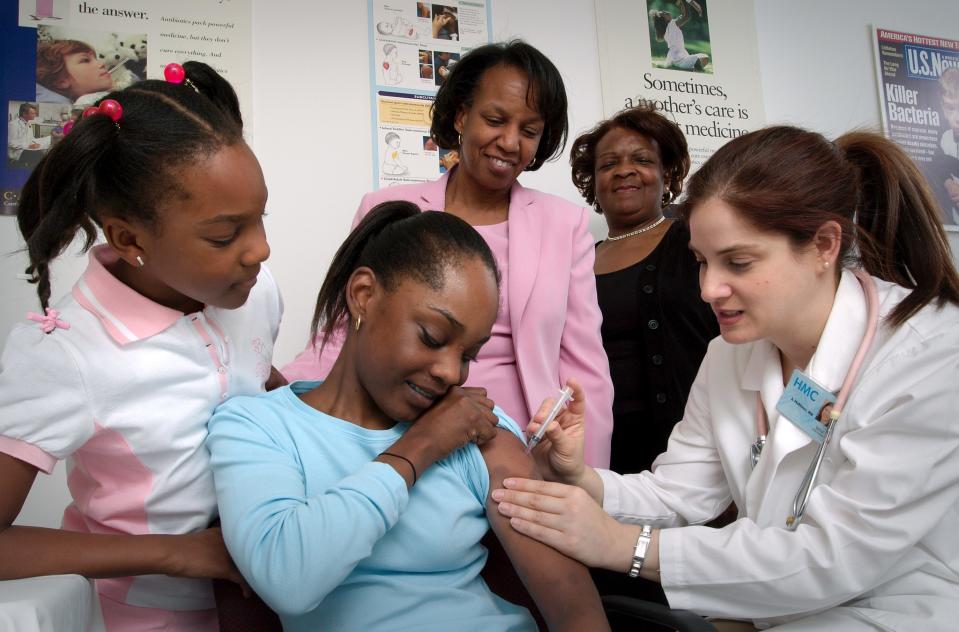Utah study: Vaccine, boosters lower hospitalization risk by 90% in coronavirus patients
Intermountain Healthcare and Utahns participated in a vaccine study with the Centers for Disease Control to gauge how effective COVID-19 vaccines are against serious illness and hospitalization.
The omicron variant has Utah hospitals struggling to stay afloat amidst the growing number of COVID-19 hospitalizations. There were 765 Utahns actively hospitalized with COVID-19 as of Thursday, an all-time high for the pandemic, including 79 people in the Southwest Utah Public Health Department.
Over the past year, Intermountain conducted a study that found boosters to be the most effective way of preventing serious illness and hospitalization, said Dr. Eddie Stenehjem, an infectious diseases physician with Intermountain Healthcare, the largest hospital operator in Utah.
“So, what we wanted to do in this study was to assess how well are vaccines working in preventing ED (Emergency Department) urgent care visits and also hospitalizations in the time of omicron," Stenehjem said Friday in a news conference announcing the report's release. "And that is data that was just published today online on MMWR (Morbidity and Mortality Weekly Report). And what it showed is that a two-dose vaccine series, especially that series that has been given over six months prior, is not nearly as effective as somebody who's had a boosted vaccine series."

Multiple boosters cut hospitalization risk by 90%, Utah study finds
The study found that boosted individuals had a 90% lower risk of hospitalization, including an 80% lower risk of urgent-care treatments, compared with an unvaccinated population. However, the original two-dose series is no longer enough to prevent hospitalization and urgent care. Stenehjem said that with how much COVID-19 has mutated, the two-dose series just doesn’t offer enough protection anymore.
“You have to be nimble with the research coming out now," he said. "Because you really have to be able to assess the effectiveness of vaccines during a time period where we have a different variant circulating. Right now, less than 10% is going to be delta, and so the vast majority of our population is being infected with omicron."
Study: COVID-19 boosters offer 'potent' protection against omicron
Using Utah patients and local health care providers allowed Intermountain Health to really localize its study, honing in on how well Utah providers are fighting the virus.
“We can then reflect back to our public to educate them to understand that, yeah, this isn't just a national study come in from other states," Stenehjem said. "These are data that are coming from Utah. These are our communities that are addressing these questions."
Intermountain Healthcare hospitals are still above capacity, with many assigning extra beds to intensive care units in order to treat the rash of COVID-19 patients. Caregivers are calling out sick with COVID-19 more often, and omicron cases across the population continue to surge. Another 11,601 new cases were reported statewide on Friday, and case rates have more than doubled over the past three weeks.
Utah doctors are also anticipating a new variant after omicron, although it's impossible to say what effect it will have on prior immunity and vaccine effectiveness.
“There's definitely going to be another variant. I mean, that's what viruses do, especially if we see worldwide circulation, there will absolutely be another variant. Stenehjem said. "To what extent prior infection with omicron is going to cover the next variant is unclear."
The hope is that omicron, with its rapid rate of infection and relatively mild health impacts compared to delta and other variants, might contribute to a more resistant population in the long run, Stenehjem said.
“If omicron provides broad neutralizing coverage against delta and other prior strains, that could be a very good thing in terms of us moving forward and having less COVID-19 in our lives," he said.
Intermountain Healthcare is encouraging anyone experiencing shortness of breath or symptomatic to still go seek treatment whether that be at the hospital, a primary care doctor, or a walk-in clinic despite high volumes of COVID-19 patients.
“Be patient with us that our volumes are incredibly high. Be kind to our caregivers. And just be patient because their volumes are incredibly high. And you know, one thing that people don't really kind of think through is that our medical-surgical wards are at 99% capacity,” Stenehjem said.
To see the study conducted by Intermountain Healthcare, visit cdc.gov/mmwr/publications/index.html.
COVID-19 in the Southwest Utah Public Health district
Hospitalizations, 55,610
Cases, 2,713
Deaths, 530
Elle Cabrera covers breaking news and topics. Please help us to continue producing this content at thespectrum.com/subscribe.
This article originally appeared on St. George Spectrum & Daily News: Boosted? New study finds that's the best way to fight long COVID

